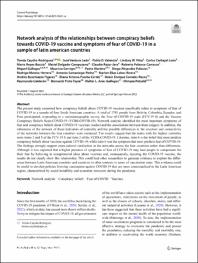| dc.contributor.author | Caycho-Rodríguez, Tomás | es_ES |
| dc.contributor.author | Ventura-León, José | es_ES |
| dc.contributor.author | Valencia, Pablo D. | es_ES |
| dc.contributor.author | Vilca, Lindsey W. | es_ES |
| dc.contributor.author | Carbajal-León, Carlos | es_ES |
| dc.contributor.author | Reyes-Bossio, Mario | es_ES |
| dc.contributor.author | Delgado-Campusano, Mariel | es_ES |
| dc.contributor.author | Rojas-Jara, Claudio | es_ES |
| dc.contributor.author | Polanco-Carrasco, Roberto | es_ES |
| dc.contributor.author | Gallegos, Miguel | es_ES |
| dc.contributor.author | Cervigni, Mauricio | es_ES |
| dc.contributor.author | Martino, Pablo | es_ES |
| dc.contributor.author | Palacios, Diego Alejandro | es_ES |
| dc.contributor.author | Moreta-Herrera, Rodrigo | es_ES |
| dc.contributor.author | Samaniego-Pinho, Antonio | es_ES |
| dc.contributor.author | Lobos Rivera, Marlon Elías | es_ES |
| dc.contributor.author | Buschiazzo Figares, Andrés | es_ES |
| dc.contributor.author | Puerta-Cortés, Diana Ximena | es_ES |
| dc.contributor.author | Corrales-Reyes, Ibraín Enrique | es_ES |
| dc.contributor.author | Calderón, Raymundo | es_ES |
| dc.contributor.author | Pinto Tapia, Bismarck | es_ES |
| dc.contributor.author | Arias Gallegos, Walter L. | es_ES |
| dc.contributor.author | Petzold, Olimpia | es_ES |
| dc.date.accessioned | 2022-11-21T17:47:59Z | |
| dc.date.available | 2022-11-21T17:47:59Z | |
| dc.date.issued | 2022-09-07 | |
| dc.identifier.uri | https://hdl.handle.net/20.500.13053/7172 | |
| dc.description.abstract | “The present study examined how conspiracy beliefs about COVID-19 vaccines specifcally relate to symptoms of fear of
COVID-19 in a sample of four South American countries. A total of 1785 people from Bolivia, Colombia, Ecuador, and
Peru participated, responding to a sociodemographic survey, the Fear of COVID-19 scale (FCV-19 S) and the Vaccine
Conspiracy Beliefs Scale-COVID-19 (VCBS-COVID-19). Network analysis identifed the most important symptoms of
fear and conspiracy beliefs about COVID-19 vaccines (nodes) and the associations between them (edges). In addition, the
robustness of the network of these indicators of centrality and the possible diferences in the structure and connectivity
of the networks between the four countries were evaluated. The results suggest that the nodes with the highest centrality
were items 2 and 5 of the FCV-19 S and item 2 of the VCBS-COVID-19. Likewise, item 6 is the belief that most predicts
conspiracy beliefs about vaccines against COVID-19; while item 6 was the symptom that most predicts fear of COVID-19.
The fndings strongly support cross-cultural similarities in the networks across the four countries rather than diferences.
Although it was expected that a higher presence of symptoms of fear of COVID-19 may lead people to compensate for
their fear by believing in conspiratorial ideas about vaccines and, consequently, rejecting the COVID-19 vaccine, the
results do not clearly show this relationship. This could lead other researchers to generate evidence to explain the diferences between Latin American countries and countries in other contexts in terms of vaccination rates. This evidence could
be useful to develop policies favoring vaccination against COVID-19 that are more contextualized to the Latin American
region, characterized by social instability and economic recession during the pandemic.“ | es_ES |
| dc.format | application/pdf | es_ES |
| dc.language.iso | eng | es_ES |
| dc.publisher | SPRINGER | es_ES |
| dc.rights | info:eu-repo/semantics/openAccess | es_ES |
| dc.rights.uri | https://creativecommons.org/licenses/by/4.0/ | es_ES |
| dc.subject | Network analysis · Conspiracy beliefs · Fear of COVID · Vaccines | es_ES |
| dc.title | Network analysis of the relationships between conspiracy beliefs towards COVID-19 vaccine and symptoms of fear of COVID-19 in a sample of latin american countries | es_ES |
| dc.type | info:eu-repo/semantics/article | es_ES |
| dc.identifier.doi | https://doi.org/10.1007/s12144-022-03622-w | es_ES |
| dc.type.version | info:eu-repo/semantics/publishedVersion | es_ES |
| dc.publisher.country | GB | es_ES |
| dc.subject.ocde | http://purl.org/pe-repo/ocde/ford#3.03.00 | es_ES |


